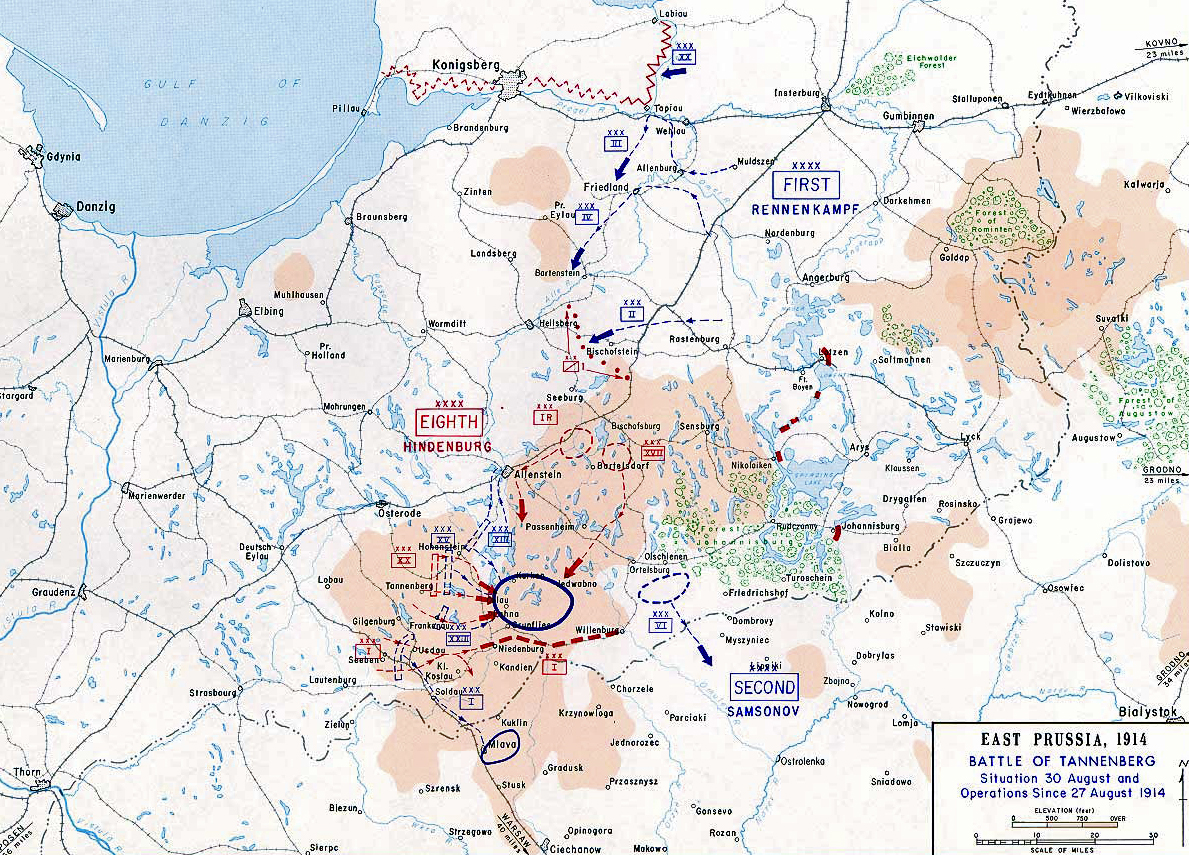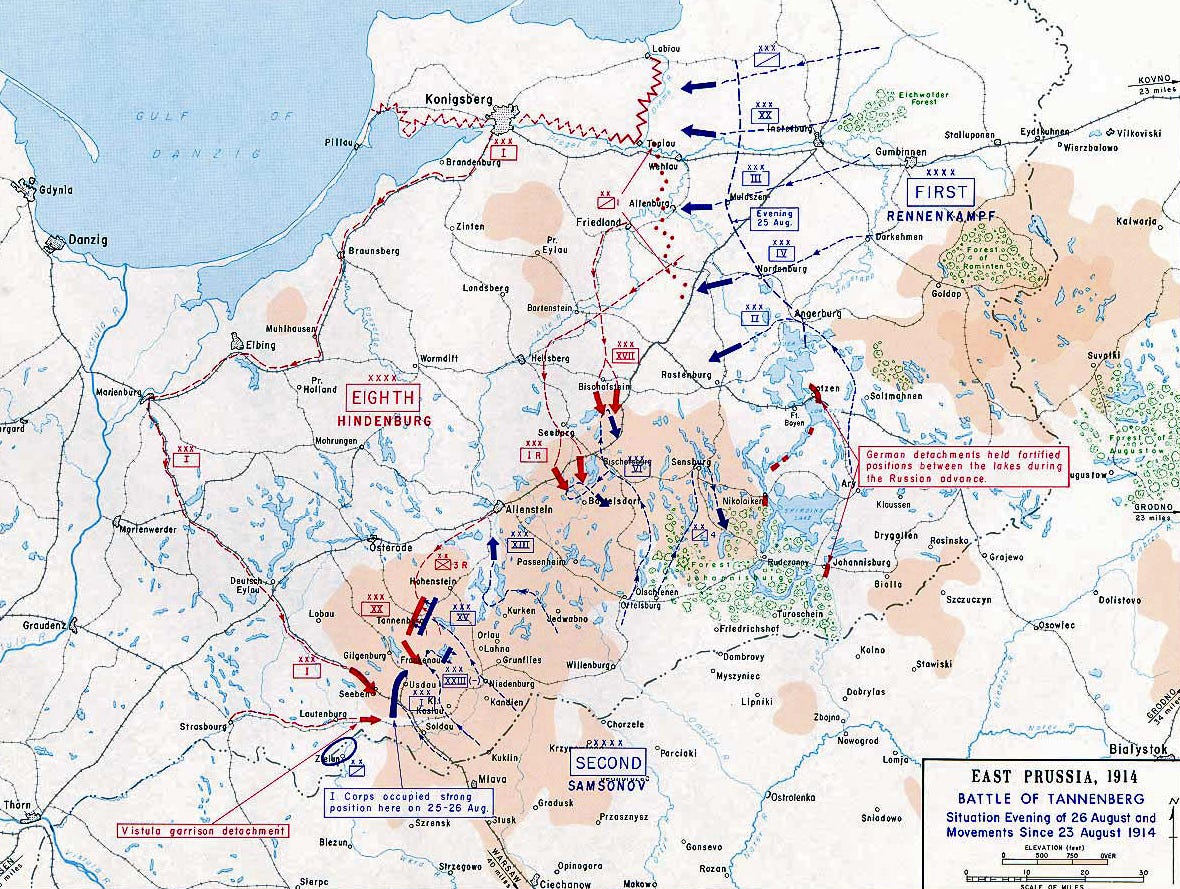|
|
Post by La Rouge Beret on Dec 19, 2021 4:22:39 GMT
As it says on the tin.
How can the Russian 1 and 2nd Army perform better against the Germans at the Battle of Tannenberg in August 1914?
One that jumps to mind is coordinating the two Army's advance. But that is complicated by the poor relationship between the two Russian Generals and the transmission of orders by radio in the clear.
|
|
miletus12
Squadron vice admiral
To get yourself lost, just follow the signs.
Posts: 7,470 
Likes: 4,295
|
Post by miletus12 on Dec 19, 2021 5:35:16 GMT
As it says on the tin. How can the Russian 1 and 2nd Army perform better against the Germans at the Battle of Tannenberg in August 1914? One that jumps to mind is coordinating the two Army's advance. But that is complicated by the poor relationship between the two Russian Generals and the transmission of orders by radio in the clear. 1. Before the Russians commit to battle, they need to organize two track rail-lines from Warsaw and Vilnius. 2. Their unpaved roads have to be cordurouyed for their wagon trains. 3. Their communications system, both field wire and RADIO has to be encrypted. The Germans had broken their crypto and the Russians knew it. 4. The Russians need a siege train to deal with the German border fortress system. 5. One cossack and his horse ate and used up as much food and supply as a regular German cavalryman. 6. German railroad gauge was wrong. Need construction equipment and railroad troops to change the German gauges to Russian gauges as the Russian armies advanced. 7. Don't let the lakes break frontages between the two armies and don't let the Germans split the army boundary seams. See MAP.  1st Russian Army should have coaxed Britwitz into a positional battle and pinned the Germans in place. using the lakes as a defensive feature. Then 2nd Russian Army should have driven along the German rail line toward Marienburg and cut Britwitz's lines of supply and isolated Koenigsberg. To call Samsonov an idiot, is to insult idiots. They have more brains than he did. |
|
oscssw
Senior chief petty officer
Posts: 967
Likes: 1,575
|
Post by oscssw on Dec 19, 2021 15:50:13 GMT
Far better Russian logistics, always a weak point under the czars.
Logistics is the bedrock on which all other aspects of war depend.
"Military logistics is the discipline of planning and carrying out the movement, supply, and maintenance of military forces."
|
|
|
|
Post by La Rouge Beret on Dec 20, 2021 22:29:55 GMT
I've been doing some reading for a Russian Great War TL and, I was astounded by the Russian ignorance of logistics by their senior staff. For instance, their war plans actually ignored how the supplies were going to travel forwards to their forward elements and rested on the assumption that they remained in continual supply. Along with the fact that their logistical element were generally the last ones to be mobilised, which unsurprisingly caused utter chaos.
|
|
stevep
Fleet admiral
Member is Online
Posts: 24,836 
Likes: 13,224
|
Post by stevep on Dec 21, 2021 13:50:09 GMT
I've been doing some reading for a Russian Great War TL and, I was astounded by the Russian ignorance of logistics by their senior staff. For instance, their war plans actually ignored how the supplies were going to travel forwards to their forward elements and rested on the assumption that they remained in continual supply. Along with the fact that their logistical element were generally the last ones to be mobilised, which unsurprisingly caused utter chaos.
Oh my God.  Considering the size and age of the Russian army that is a crippling error in itself. In Napoleonic times, if you didn't might making enemies everywhere you go, armies could munitions aside, largely live off the land but 1914 armies were so complex and large, especially in the Russian case, that attempting this was a recipe for disaster. It's amazing how successful the Russian army was with an handicap like that. |
|
miletus12
Squadron vice admiral
To get yourself lost, just follow the signs.
Posts: 7,470 
Likes: 4,295
|
Post by miletus12 on Dec 21, 2021 17:02:55 GMT
Far better Russian logistics, always a weak point under the czars.
Logistics is the bedrock on which all other aspects of war depend.
"Military logistics is the discipline of planning and carrying out the movement, supply, and maintenance of military forces."   Map. Shaded terrain is high ground. Article about Tannenberg.Observations. 1. I made an incomplete observation above. I wrote... What I should have written was... The Russians did forage and live off the country. The Germans drew supply and fodder (cavalry) off of their rail heads from dumped stores. 2. The weather and terrain effects hamper operational art for both sides. It rained. The region is hilly and well-dotted with lakes. Think of Sweden if one is European or Wisconsin if one is an American. The communications network was a transportation desert on the Russian side of the border with two single track rail lines, onde from Vistula and the other from Warsaw acting as the supply routes and sustainment land lines of communication for the Russians. It rained, making the unpaved roads cut through the dense forests almost impassible for Russian wagon trains with their over-burdened wagons. And as I note, Russian foraging was inefficient. Something else one notices: Sources are: Buttar, P. Collision of Empires: the War on the Eastern Front in 1914. Osprey. 2014. p. 120, 122 Keegan, J. The First World War. Vintage Canada. 2000. pp. 144–145 The takeaway one finds is that Rennenkampf was infantry and artillery poor despite having twice the men on the rolls as Samsonov. His cavalry ate up more than 2/3 of his supply. His was the more bottlenecked land line of communication network and his terrain was more canalized (literally) by water obstacles and German fortifications. Yet the Russians put the most cavalry and least artillery on this threat axis. Why? Rennenkampf should have been the one with the infantry. The Cossacks should have been Samsonov's as his threat axis was more suited for raiding and land lines of communication disruption operations. The Germans used their cavalry to throw up a screen against Rennenkampf. This was backed by jaeger troops (rangers) who knew the terrain and they fought a delay action, while Hindenburg sent 90% of his combat maneuver and most of his field artillery power against Samsanov and thus tickled the Russian second army's flanks. Panic sets in there. Instead of firming up his shoulders on the German approach routes; Samsonov curls his army up like an infant, (Morse messages not encrypted sent over the wireless for Rennenkampf to come save him in the clear no less.), and Rennenkampf remembers that he hates Samsonov's guts and so gets the slows. The rains still pour down and clog and muddy the roads for everybody while German delay parties manage an obstacle defense in front of the Russian first army. Rennenkampf keeps moving west instead of shifting southwest as he ought. And then Samsonov is artilleried to death. He shoots himself. Rennenkampf will screw up in turn as he bunches himself into another immobile blob, like Samsonov did, and is pinned around the Masurian Lakes, which acts as his terrain strait jacket. He gets exactly what Samsonov got. Hindenburg becomes famous for what Ludendorff did; or a six-year child could have done to the Russians here. Tannenberg is not exactly Chancellorsville. Strictly amateurs play this war sonnet. |
|






 Considering the size and age of the Russian army that is a crippling error in itself. In Napoleonic times, if you didn't might making enemies everywhere you go, armies could munitions aside, largely live off the land but 1914 armies were so complex and large, especially in the Russian case, that attempting this was a recipe for disaster. It's amazing how successful the Russian army was with an handicap like that.
Considering the size and age of the Russian army that is a crippling error in itself. In Napoleonic times, if you didn't might making enemies everywhere you go, armies could munitions aside, largely live off the land but 1914 armies were so complex and large, especially in the Russian case, that attempting this was a recipe for disaster. It's amazing how successful the Russian army was with an handicap like that.
